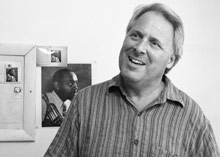The first stop on Richard Layman’s journey to radio was tragedy.
On a morning in 1993, two years after he moved to Asheville from Boston, Layman was driving to work on Highwway 23 when a rear tire blew out. His car veered across an overpass and came to rest for a few seconds on the edge before toppling over. It fell nearly 60 feet to the road below.
The impact triggered a blood clot that pointed, dagger-like, toward Layman’s brain. The resulting stroke all but shut down the left side of his body, and destroyed his decades-long career as a classical guitarist. Layman was 42 at the time. The accident, he says, “changed everything.”
During his months of recovery, Layman passed through nearly every emotional state, from gratitude at simply being alive to the blackest hue of despair. On a particularly bad day, his vocational therapist posed what he calls “a very interesting question.”
“Richard,” he recalls her asking, “what other passion besides classical guitar have you had in your life?’ ” His answer: “FM radio.” Serendipity took over from there, and the therapist put Layman in touch with an acquaintance at public-radio station WCQS-88.1. Late the following year, his weekly jazz program, “Jazz Shack,” went on the air.
Now in its 14th year, Jazz Shack, runs from 10 p.m. to midnight every Friday, and showcases Layman’s personal collection of jazz music, which commands a wall in his Asheville cottage, all cracked paperboard and pristine vinyl. Layman’s tastes are wide-ranging, but he admits a special affection for the jazz of the 1920s, when the genre hewed closely to its dancehall roots. “You have to keep in mind that it was dance music. Good times music,” says Layman. “It was people getting together on Friday nights and entertaining. That’s what it was originally intended for.”

The marks of the first giants of jazz—Louis Armstrong, King Oliver, Sidney Bechet, Bix Beiderbecke—are all over the music that followed, from the frantic saxophone harmonies of Charlie Parker to the austere, muted trumpet lines of Miles Davis. One needs only to listen closely enough to discover the music’s continuity, even in the most “out there” solos, Layman says.
“Sometimes people say ‘where’s the melody?’ in, say, the late jazz of John Coltrane. But it’s like anything—you have to start by learning the basic, simple things that go into making the art and then put it all together. You can’t go into John Coltrane without having heard Louis Armstrong.”
Important too, Layman believes, is an understanding of the music’s historic and cultural context, from the Great Depression to Prohibition, Jim Crow to the dissipative influence of heroin and other drugs on the jazz scene of the 1940s and 1950s.
“I’m not saying you should focus on it, but it was the social milieu,” he says. “It helps to know about it.” In the misfortune that dimmed, and in some cases snuffed out, the brilliance of so many jazz lives, Layman sees an analogy to the Greek myth of Icarus. “He flew too close to the sun, burned his wings and fell to his death,” he says. “Bix Beiderbecke died of alcoholism. Billie Holiday and Charlie Parker from heroin—the list goes on and on.”
Layman’s own brush with tragedy is evident to this day in his left hand, which curls in a loose, involuntary fist, and his a wide-swinging gait, the result of an obstinate left foot. But his voice is velvet, and his skills behind the microphone are musical in their own right.
“When I learned that I’d never play the guitar again, I thought ‘Oh man, what is going to replace this?’” he says. “But I’ve really come to understand that the FM control board is my new instrument.”
Layman leans back in an armchair in the corner of his small living room and sips from a tumbler of white wine. “I haven’t quite hit my peak yet,” he says, his ruddy, boyish face breaking into a dimpled smile. “I’m still working on that. But I think I’m headed in the right direction.”
The Jazz Shack’s essential recordings
Whether you’re new to jazz or just need to rekindle your interest in the genre, “Jazz Shack” host Richard Layman suggests you get your hands on these half-dozen classic recordings:
1) Louis Armstrong—“The Complete Hot Fives and Hot Sevens” (Sony)
2) Bix Beiderbecke, Frank Trumbauer and Jack Teagarden—“The Complete Okeh/Brunswick recordings” (Mosaic)
3) John Coltrane—“My Favorite Things” (Atlantic)
4) Charles Mingus—“The Complete 1959 Columbia Recordings” (Sony)
5) Miles Davis—“Kind of Blue” (Sony)
6) Thelonious Monk—“Thelonious Monk Quartet with John Coltrane at Carnegie Hall” (Blue Note)



As a longtime acquaintance of Richard Layman I am sad that he did not let the interviewer into his little secret, namely that his love of jazz is matched by his love of classical music. On his groaning shelves of recordings Bach Mozart Schubert et al. compete for pride of place with the great jazz masters. (He is an honors graduate of Mannes College, a New York music conservatory that includes Murray Perahia, Richard Goode, Frederica von Stade and Burt Bacharach among its alumnae/i.) It seems like yesterday when I attended with him a concert in Boston celebrating the music of Igor Stravinsky and conducted by the great man himself. Bix Beiderbeck or Fats Waller couldn’t have made him happier.
P.S. Layman is very lucky to have met with such a competent and graceful writer as Kent Priestley.
A great article about a true artist. Richard, who I was fortunate to have made music with in the 70’s, has always been open to that which can not be expressed by words alone. Not only that, but he has opened my ears to beautiful and expressive music in many styles.